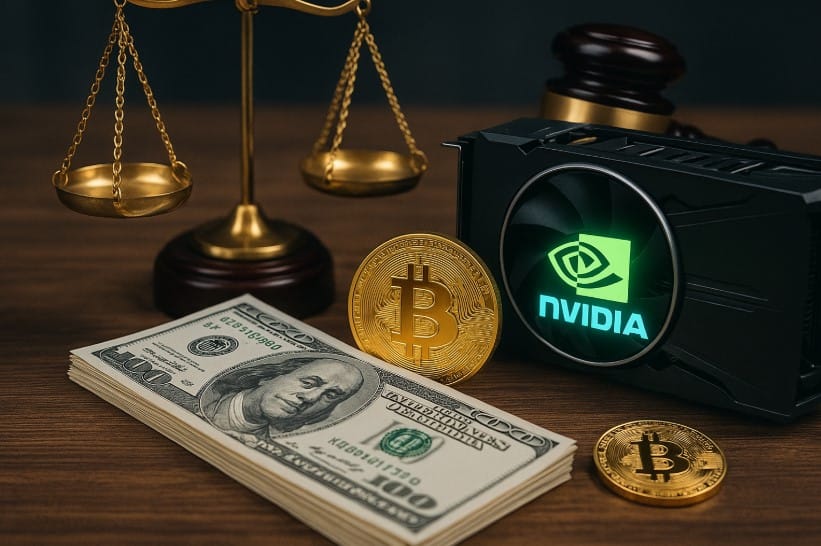Now Reading: Crypto Mining Scandal: NVIDIA Fined $5.5M for Hiding Profits
- 01
Crypto Mining Scandal: NVIDIA Fined $5.5M for Hiding Profits

Crypto Mining Scandal: NVIDIA Fined $5.5M for Hiding Profits
NVIDIA was fined $5.5M for hiding crypto mining revenue from investors. Discover what happened, why it matters, and the key lessons from this crypto mining scandal.
NVIDIA’s $5.5M Crypto Mining Scandal
So, imagine you’re throwing a party. It’s loud, lights flashing, everyone’s having a good time. But someone forgets to mention that they charged guests at the door and didn’t tell the homeowner, who just happens to be the IRS. That’s kind of what happened with NVIDIA. Only instead of a party, this time it was crypto mining, and instead of forgetting to mention it… NVIDIA got fined $5.5 million for hiding how much money it made from it.
Let’s rewind. Back in 2021, crypto was booming. People were mining coins like their lives depended on it, and NVIDIA’s graphics cards originally made for gaming were suddenly the go-to tools for crypto miners. These high-powered GPUs were flying off the shelves, and NVIDIA’s sales numbers were looking amazing.
But according to the U.S. Securities and Exchange Commission (SEC), NVIDIA didn’t quite tell the whole story. The company reported the revenue boost in its gaming division but didn’t clarify that a significant chunk of that cash was actually coming from cryptocurrency mining. That’s a big no-no in the eyes of regulators. Why? Because investors need to know where a company’s money is really coming from especially when that revenue is tied to something as volatile as crypto.
In May 2022, the SEC came knocking. They fined NVIDIA $5.5 million for “inadequate disclosures” around its cryptocurrency mining revenue. That’s like getting caught fibbing on your report card and your parents finding out your A in math was actually a D covered in glitter.
The SEC’s official statement summed it up pretty clearly:
“NVIDIA’s disclosure failures deprived investors of critical information to evaluate the company’s business in a key market.” (Source: SEC.gov News Release – May 2022)
Now, just to be clear, NVIDIA didn’t admit to doing anything wrong. And they didn’t deny it either. They just paid the fine and kept it moving. But for anyone watching, especially tech companies flirting with crypto markets, it was a wake-up call.
This wasn’t just a slap on the wrist. It was a loud message: if you’re making money off cryptocurrency mining, you’d better be honest about it even if you’re a billion-dollar company known for powering epic gaming experiences.
And honestly? For the rest of us watching from the sidelines, it’s a wild example of how the crypto craze doesn’t just shake up digital wallets, it shakes up Wall Street too. Let us break things down for better understanding.
What Is Crypto Mining, Really?
Honestly, crypto mining sounds like something out of a sci-fi movie. You picture a guy in a hoodie, typing away in a dark basement while mysterious green numbers scroll across his screen. But in reality? It’s way less dramatic… and way more like solving a really, really hard math problem over and over again.
So, here’s the deal: crypto mining is the process that keeps cryptocurrencies like Bitcoin and Ethereum running. When people make transactions say, buying a slice of pizza with Bitcoin, those transactions need to be verified and added to a digital ledger called the blockchain. But before they’re locked in, someone or something needs to make sure they’re legit and accurate.
That’s where miners come in.
Miners use super-powerful computers like the ones powered by NVIDIA graphics cards to solve complicated puzzles. When they solve one, they get rewarded with a little bit of cryptocurrency. It’s kind of like a lottery where the more power your machine has, the better your chances of winning.
And that’s why NVIDIA got pulled into all of this. Their high end GPUs, originally designed for gaming, turned out to be perfect for mining crypto too. Suddenly, they were selling like hotcakes, not to gamers, but to crypto miners. It was a surprise gold rush, and NVIDIA was sitting on a mountain of pickaxes.
The problem? As we talked about earlier, they didn’t make it clear to investors that this spike in sales was driven by cryptocurrency mining. And since crypto is known for being a rollercoaster of value, investors weren’t given the full picture of the risks tied to that income stream.
Now, you might be wondering—why is cryptocurrency mining such a big deal anyway?
Well, aside from the money, it also eats up a ton of electricity. According to the Cambridge Bitcoin Electricity Consumption Index, global Bitcoin mining uses more power annually than some entire countries (Cambridge CBECI). That’s not just mind-blowing, it’s also sparking debates around the environmental impact of mining.
So yeah, crypto mining isn’t just nerds with big computers. It’s a high-stakes game with real-world consequences. And when companies like NVIDIA start riding that wave, transparency is key, not just for investors but for everyone trying to understand where the tech world is headed.
Hidden Cryptocurrency Mining Revenue
Let’s talk numbers and the fine line between clever accounting and flat-out not telling the whole truth.
When NVIDIA saw a spike in sales for its high-powered GPUs, it reported those gains under its gaming division. Totally makes sense at first glance, right? After all, these graphics cards are built for gaming. But here’s the catch: a significant number of those sales weren’t going to gamers, they were going to crypto miners.
Now, why does that matter?
Because cryptocurrency mining revenue isn’t the same as gaming revenue. It’s unpredictable. One day Bitcoin is flying high, and the next it’s crashing harder than your internet during a Zoom call. Investors need to know when a company’s earnings are tied to something that volatile. It helps them make smarter choices, and, well… avoid surprises too.
But according to the SEC, NVIDIA didn’t properly disclose that this boost in sales was being driven by the cryptocurrency mining craze. They buried it under “gaming,” which painted a more stable and less risky picture than what was really going on.
Here’s how the SEC put it:
“NVIDIA’s omissions of material information about the impact of crypto mining on its gaming business were misleading.” (Source: SEC Order Against NVIDIA – May 6, 2022)
It’s like baking brownies with walnuts, then not telling anyone. Someone’s going to bite into it expecting chocolatey goodness and get a surprise crunch. If they’re allergic? That’s a whole other issue.
Companies have a responsibility to be transparent, especially when dealing with something as up-and-down as crypto. NVIDIA’s failure to disclose the crypto mining revenue didn’t just cost them $5.5 million, it dinged their credibility with investors and regulators.
It’s a reminder that in business, honesty isn’t just the best policy, it’s the legal one, too.
Why It Matters
You might be thinking, “Alright, NVIDIA got fined, so what? Big companies mess up all the time.” And yeah, that’s true. But this wasn’t just a whoopsie on a spreadsheet. This story matters a lot, not just for tech giants like NVIDIA, but for investors, gamers, crypto enthusiasts, and really, anyone trying to play it smart in a fast-moving digital world.
First off, the tech industry is built on trust. When a company like NVIDIA, one of the biggest names in gaming hardware, decides not to be fully upfront about something like crypto mining revenue, it creates a ripple effect. Investors rely on financial reports to make decisions. If those reports leave out key details like a major shift in who’s actually buying the products, it’s like flying blind through a storm.
For example, if investors had known NVIDIA’s big jump in GPU sales came from crypto miners rather than gamers, they might’ve predicted a drop once the crypto market cooled (which it always does). That’s valuable info, the kind of insight that helps avoid losses when trends change overnight.
But it’s not just about Wall Street. Regular folks like gamers, students, digital artists and others were caught up in this too. Remember when graphics cards were impossible to find and the prices were through the roof? A lot of that was because miners were buying them in bulk, and NVIDIA’s lack of transparency didn’t help anyone understand why the shelves were empty.
And let’s not forget regulation. This case is a red flag to other tech companies: if you’re profiting off crypto mining or any other niche trend, don’t try to quietly slide it under another label. The SEC is watching. In fact, this case may open the door for tighter regulations on how tech companies report revenue sources tied to crypto and digital assets (Harvard Law – SEC’s Growing Focus on Crypto).
This is a lesson in transparency, timing, and the cost of staying silent when the truth really matters. Whether you’re holding stock, building a gaming rig, or mining crypto in your garage, this kind of news hits home.
Crypto Mining: Lessons from NVIDIA
So, what can we take away from all this?
Honestly, the NVIDIA crypto mining scandal isn’t just a tech industry drama, it’s a story packed with real-life lessons for anyone who deals with money, technology, or… well, life. Whether you’re a weekend gamer, a crypto hobbyist, or just someone curious about how these giant companies roll, this situation shows just how quickly things can go sideways when transparency takes a backseat.
First off, companies—especially massive ones like NVIDIA aren’t immune to making shady or sloppy decisions. And while they might survive a $5.5 million fine without blinking, trust isn’t so easy to buy back. Once investors, customers, or even regulators start questioning your honesty, the damage lingers.
And for the rest of us? It’s a reminder to stay informed. Crypto mining might sound like something distant or irrelevant, but its impact shows up in everything from your investment portfolio to the price of computer parts. So, it pays literally to stay sharp.
More than anything, this is about the power of asking good questions. Where’s the money coming from? Who’s really buying this stuff? Is this hype, or is it real value?
Because in a world where tech moves fast and the rules are still catching up, clarity is everything.
A Friendly Tip Before You Go…
If you found this article helpful, share it with a friend who’s into tech or crypto. And if you’re navigating the world of AI, digital finance, gaming, or just want to understand tech a little better, stick around. We’ve got plenty more insights coming your way. Stay smart, stay curious and don’t forget to question the glittery stuff.















